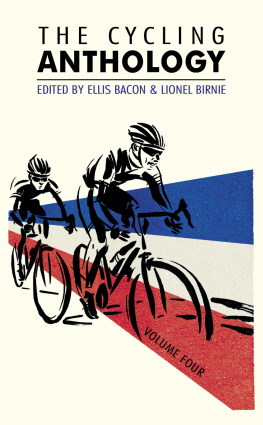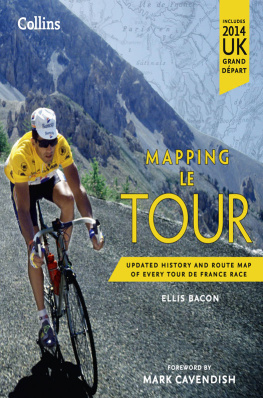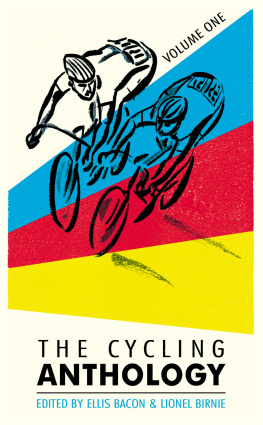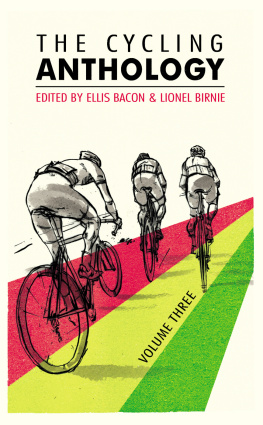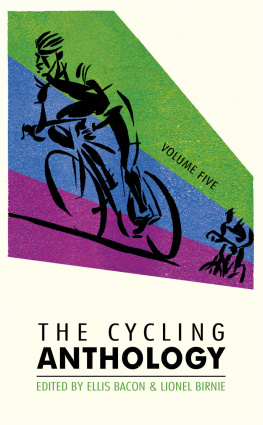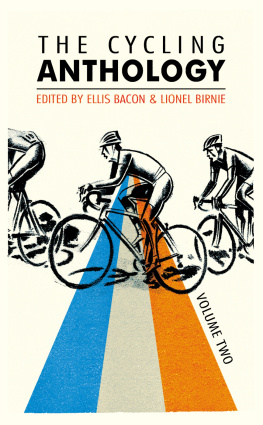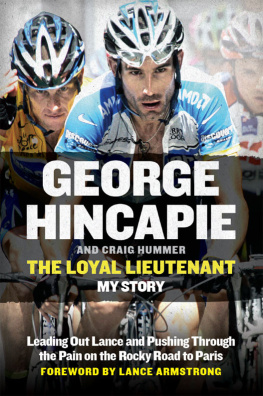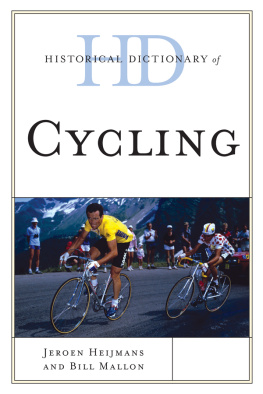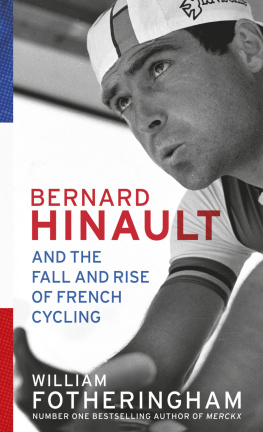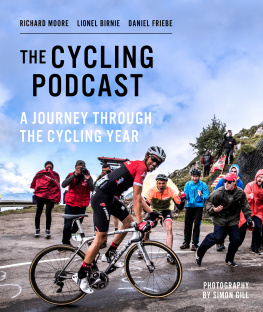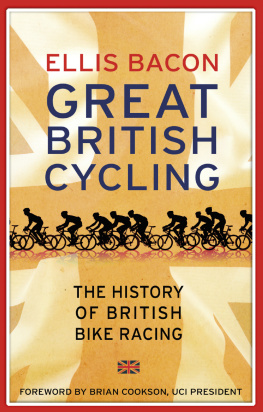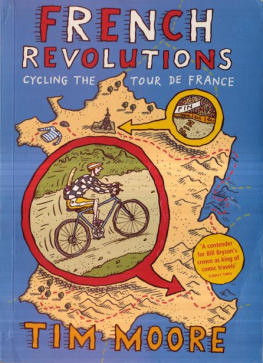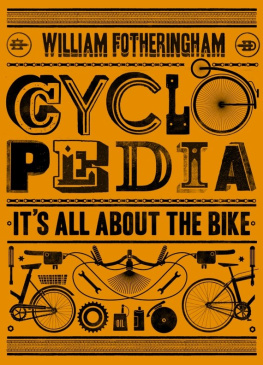CONTENTS
THE NEUTRALISED ZONE
INTRODUCTION BY THE EDITORS
THE INIMITABLE JOCK WADLEY
WILLIAM FOTHERINGHAM
LIGHTS, CAMERA, ACTION
ORLA CHENNAOUI
ZEN AND THE ART OF GRAND TOUR SPRINTING
LIONEL BIRNIE
INSIDE THE PARISIAN DREAM FACTORY
JAMES STARTT
THE CRASH
MATT STEPHENS
IL PIRATA
DANIEL FRIEBE
A DAY TRIP TO DEVON
KEITH BINGHAM
THE LONG-DISTANCE LORRY DRIVER*
RICHARD MOORE
KEN RUSSELLS TOUR
PETER COSSINS
TAPPING OUT A RHYTHM
ELLIS BACON
THE OTHER SIDE OF THE COIN
ALASDAIR FOTHERINGHAM
THE NEARLY MEN
TOM SOUTHAM
About the Book
Professional cycling is a rich, dynamic and often controversial sport that lends itself to great writing. Some of the most famous and illustrious races were founded by newspapermen and The Cycling Anthology continues this tradition by bringing together the best in the business.
Volume Four features original and exclusive pieces by leading cycling writers. William Fotheringham remembers the journalist who was instrumental in bringing road-racing to a British audience; Ellis Bacon looks beyond Queen to the link between bikes and beats; Richard Moore finds out what happened to that little punk (Lance Armstrongs words), Iban Mayo, and asks if he really did become a long-distance lorry driver; Daniel Friebe re-examines the ups and downs of Marco Pantani; Tom Southam explains what its like not to ride the Tour de France; and much more.
Between them, these writers have covered hundreds of Tours de France and written dozens of excellent books and some have even ridden the Tour. Here, their work is showcased together.
About the Authors
Lionel Birnie is a journalist, author and publisher who specialises in cycling. He is the freelance cycling correspondent for The Sunday Times and writes for Cycle Sport and Cycling Weekly, two of Britains leading cycling magazines.
Ellis Bacon is one of Britains most experienced cycling journalists. He is the former deputy editor of Procycling magazine, and has written extensively for Cycling Weekly and Cycle Sport.

This ebook is copyright material and must not be copied, reproduced, transferred, distributed, leased, licensed or publicly performed or used in any way except as specifically permitted in writing by the publishers, as allowed under the terms and conditions under which it was purchased or as strictly permitted by applicable copyright law. Any unauthorized distribution or use of this text may be a direct infringement of the authors and publishers rights and those responsible may be liable in law accordingly.
Version 1.0
Epub ISBN 9781448191642
www.randomhouse.co.uk
Published by Yellow Jersey Press 2014
2 4 6 8 10 9 7 5 3 1
Copyright Peloton Publishing 2014
Each author has asserted their right under the Copyright, Designs and Patents Act 1988 to be identified as the author of their work
First published in Great Britain in 2012 by
Yellow Jersey Press
Random House, 20 Vauxhall Bridge Road,
London SW1V 2SA
www.vintage-books.co.uk
Addresses for companies within The Random House Group Limited can be found at: www.randomhouse.co.uk/offices.htm
The Random House Group Limited Reg. No. 954009
A CIP catalogue record for this book is available from the British Library
ISBN 9780224092432
THE NEUTRALISED ZONE
INTRODUCTION BY THE EDITORS
THIS IS THE fourth edition of The Cycling Anthology and we hope all our readers enjoy the eclectic mix of essays weve compiled this time.
In years to come, 2014 will be looked back upon as the year that Belfast hosted the start of the Giro dItalia and Yorkshire welcomed the Tour de France and so there is a British core to many of the stories.
Having established The Cycling Anthology as a home for brilliant, original writing about the worlds greatest sport, we are delighted to have joined forces with Yellow Jersey Press as our new publisher.
As cyclings popularity continues to grow, we look forward to compiling further collections of varied, timeless and illuminating chapters from some of cyclings best writers.
Ellis Bacon and Lionel Birnie
remembers journalist Jock Wadley a man instrumental in bringing European road-racing to a British audience during a career that stretched from the 1930s to the 1970s, and whose knowledge of the Tour de France was so great that he helped navigate Brian Robinson and the Great Britain team through the 1955 Tour.
THE INIMITABLE JOCK WADLEY
BY WILLIAM FOTHERINGHAM
SOMETIME IN THE 1990s, I rode a race in the windy Essex steppes entitled the Jock Wadley Memorial. I didnt make an impression on the race which was par for the course and apart from the usual pain and angst it didnt make a huge impression on me. I knew that Wadley had been a journalist, but that was all I knew. There were other memorial events on the calendar for other worthies, and at the time I didnt pause to reflect further.
It was only later that I realised I had read Wadleys words time and time again, years before. As a cycling-obsessed teenager, reading my fathers copies of obscure sepia-tinted cycling magazines until my bum went numb, I hadnt been that interested in the names at the end of the articles, only the names within them: Jacques Anquetil, Eddy Merckx, Tom Simpson, Les West, Colin Lewis.
The black and white copies of Sporting Cyclist from the late 1950s through the 1960s, between A4 and A5, roughly the size of a quarto hardback book, and the larger format full-colour International Cycle Sport from the early 1970s had one other thing in common: they were Jock Wadleys babies. Those magazines clearly mattered to my dad, as they had stayed with us through various house moves before my mother put her foot down and they had been relegated to a box in a cobwebby closet. Since then, they have come to matter to me too.
One passage in bold type stood out, from the very back of the August 1967 edition of Sporting Cyclist, penned by Wadley immediately after a cataclysmic event in British sport, and headlined simply July 13. Clearly, the news that Tom Simpson had died on the Ventoux Wadleys on-the-spot piece and Roy Greens editorial had had to be shoehorned into the final pages of that months magazine at the very last moment before it went to press. It was no less a tribute for all that.
I still cannot believe it, and neither, I am sure, could you until you saw it in cold print, that we shall never see Tom Simpson on a road or track again, wrote Wadley. At the finish, the British team car driver Ken Ryall gave me details of the tragic event which you all know by now.
In the press room two hours later, there was an unbearable tension when Flix Lvitan came in to give us the dreadful news.
Dozens of journalists of all nationalities were in tears. Terrible enough that any rider should have lost his life on the road. A matter of the deepest personal distress that the Ventoux victim was not just a champion but a friend of us all.
This morning at Marseille I saw a photograph of Tom making the last sprint of his life, beaten narrowly by Gerben Karstens in the overnight stage. Tom was laughing heartily and clearly enjoying the gallop.
I chatted with Tom before the tragic 19th stage started and I knew that he pedalled off towards his appointment with destiny on the Ventoux the happiest of men.
You didnt have to make a massive mental leap to feel the pain in the words, and imagine their being written at speed by a man in a state of shock. How could that stark black type fail to make an impression as I discovered this new and exotic world? No surprise then that they stayed with me when I wrote my biography of Simpson,
Next page
